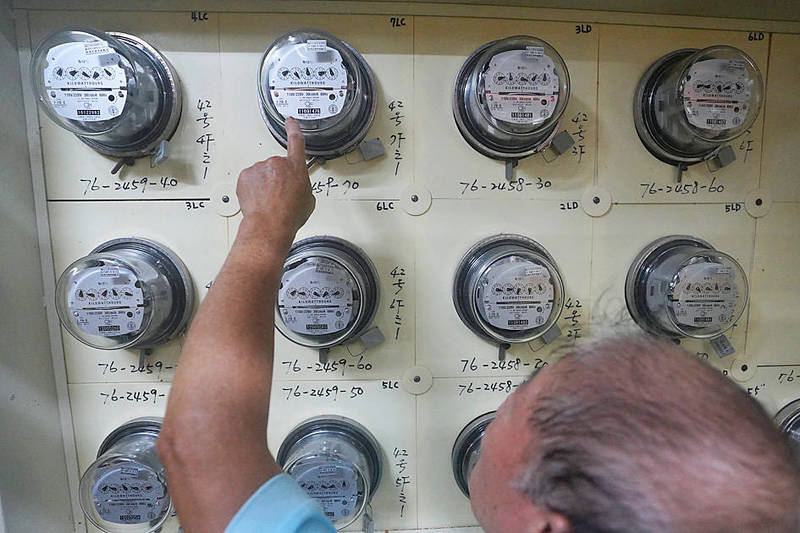《TAIPEI TIMES》 Electricity rates to remain unchanged

A man points at an electricity meter in a building in Taipei yesterday. The Ministry of Economic Affairs is to maintain electricity rates unchanged at NT$2.6253 per kilowatt-hour for the next six months. Photo: CNA
ACCOUNTING NEEDS: The economics ministry did not lower electricity rates, despite falling oil prices, because it needs to replenish a fund to decommission nuclear plants
By Angelica Oung / Staff reporter
Electricity rates are to remain unchanged at NT$2.6253 per kilowatt-hour for the next six months, the Ministry of Economic Affairs said yesterday following a meeting of its electricity price review committee.
Electricity rates have not been altered in the four meetings since September 2018, and the committee decided to keep the rates unchanged until March 31 next year, before it holds its next twice-yearly meeting, the ministry said.
Saying that price stability is the overriding consideration of the committee, Deputy Minister of Economic Affairs Tseng Wen-sheng (曾文生) told reporters at a news conference that the body opted not to lower electricity prices, despite slumping crude oil prices.
“While oil prices have fallen considerably, the US Energy Information Administration expects crude oil prices to rise to US$50 a barrel in 2021, compared with US$42 a barrel this year,” Tseng said.
Taiwan Power Co’s (Taipower, 台電) nuclear power back-end operational costs were another factor affecting the review of electricity rates, the ministry said.
Taipower would earmark NT$24.2 billion (US$820.73 million) for its Nuclear Power Back-end Operations Fund this year to pay for the decommissioning of nuclear power plants, Tseng said.
The operational costs swelled from NT$335.3 billion in a 2008 estimate to NT$472.9 billion in a 2017 estimate, he said.
“We need to make up the difference as quickly as possible from an accounting perspective,” he added.
After taking into account those factors, and comprehensively considering the price stability policy and the steady operation of Taipower, the committee decided to maintain the stability of electricity prices, Tseng said.
Meanwhile, if Taipower this year posts “a reasonable profit” of 5 percent of its revenue, the surplus would go to the energy price stabilization fund, which was established by the government to ameliorate the effects of short-term fluctuations in electricity prices on the economy, Tseng said.
There is currently NT$10.8 billion in the fund, he said.
Taipower, the nation’s largest electricity supplier and monopoly grid operator, is expected to be in the black this year, the ministry said.
The company reported a pretax profit of NT$8 billion in the first seven months of this year, up from a loss of NT$28.2 billion in the same period last year, according to the company’s Web site.
Tseng declined to make predictions about possible electricity rates, saying that there are too many uncertainties to take into account.
新聞來源:TAIPEI TIMES
















